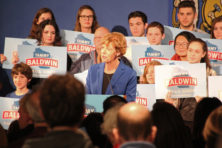Reps in the News: Baldwin Seeks Rural Development Funding
- Share
- Tweet
- Pin
- Share
Governor Scott Walker
Gov. Walker announced he is seeking applicants for a student representative on the Wisconsin Technical College System Board. The student representative is appointed for a term that will expire May 1, 2019. The student must be above the age of 18, a state resident, enrolled at least half-time, and be in good academic standing. Please note that due to Wisconsin Indianhead Technical College having been recently represented on the board, no applications may be accepted from this institution.
The Wisconsin Technical College System Board is the coordinating agency for the Wisconsin Technical College System. The board establishes statewide policies and standards for the educational programs and services provided by the 16 technical college districts that cover the state.
If you are interested in applying for the position, submit a cover letter, resume and essay found on Governor Walker’s website: walker.wi.gov.
The deadline for submitting application materials is noon on Friday, May 4, 2018. Potential applicants with questions about the appointments process may contact Dan Sievert at 608.266.1212.
Source: Walker press release
Senator Tammy Baldwin
Sen. Baldwin, a member of the Senate Appropriations Committee, worked to secure major investments to rural development programs that the Trump Administration proposed eliminating in the bipartisan Fiscal Year 2018 omnibus spending legislation.
“Rural communities across Wisconsin face challenges with infrastructure, broadband and creating economic opportunity. Too often, small towns get left behind as investors find it more attractive to go to the big cities. That’s why I prioritize fighting for strong investments in rural communities,” Baldwin said. “Washington has spent too much time debating instead of making progress. I am proud that we were able to reverse proposed cuts and provide strong funding for the key tools our communities use to fund rural drinking water projects, broadband deployment and business development.”
Baldwin worked across party lines in the Senate Appropriations Committee and successfully fought to reverse these cuts and include strong investments for rural America in the FY2018 Agriculture Appropriations bill. In January, Senator Baldwin met with the Assistant to the Secretary for Rural Development at the U.S. Department of Agriculture (USDA) to share Wisconsin’s priorities for rural development and urge the Trump administration to invest in our rural communities. In total, Wisconsin received $627.1 million in rural development investments in 2017.
Source: Baldwin press release
Senator Ron Johnson
Sen. Johnson said it’s too early to say whether he’ll support a re-election bid for Donald Trump in 2020, adding to a growing list of conservatives on Capitol Hill who are holding out their endorsements for their party’s President.
“It’s way too early to be talking about 2020,” Johnson told CNN’s New Day co-anchor Chris Cuomo. “It could be a completely different world by 2020. We have a 2018 election first.”
Johnson joins a wide array for House and Senate GOP members not yet ready to endorse Trump. CNN reported that Senate Majority Whip John Cornyn, Tennessee Sen. Lamar Alexander and South Carolina Rep. Mark Sanford are among the Republicans who are holding out their official support for Trump in 2020.
Source: CNN
President Donald Trump
More than 570 members of the National Academy of Sciences (NAS) published a statement on Monday decrying the Trump Administration’s “denigration of scientific expertise and harassment of scientists.” The members, who are acting independently of the NAS, represent many fields (social, biological, environmental, physical), but they note that the White House’s “dismissal of scientific evidence” has been “particularly egregious” in the case of climate change. They cite the Administration’s recent effort – led by Scott Pruitt, the head of the Environmental Protection Agency, and supported by President Trump – to hold a “Red Team/Blue Team” debate on the validity of global-warming research. “Such an exercise seeks to foster the erroneous impression of deep uncertainty concerning the reality and seriousness of anthropogenically driven climate change,” they write. Benjamin Santer, a 62-year-old atmospheric scientist at the Lawrence Livermore National Laboratory led the effort to draft the statement. Because his work is almost entirely funded by the Department of Energy, he now fears losing his job. “There are powerful individuals out there who do not like criticism, who do not like being told they are wrong, and do not like being told they are disseminating ignorance,” he said. “Some of these people have shown themselves to be vindictive.” At the same time, he felt he could not remain silent. “There is no point in being a scientist if you are unwilling to defend the technical work you do, especially when that work is mischaracterized by powerful members of the Administration,” he explained.
Santer’s research in the early nineties was some of the earliest to demonstrate humanity’s influence on the global climate, and he has since added substantially to that body of work. While he has faced public and governmental pushback to his and his colleagues’ findings many times before, the experience of the past year and a half has been unprecedented, he said. He pointed to Pruitt’s Senate confirmation hearings in January 2017, in which the EPA nominee claimed that satellite data shows a “leveling off of warming over the past two decades.” By examining all the satellite data “available in the world,” Santer said, he and several colleagues “were able to show that this claim was incorrect.” They published the results of their investigation in Nature Scientific Reports last May.
Source: The New Yorker

